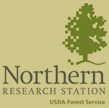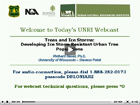Urban Forests – Composition – Soils
Urban Soils
Soil research in urban ecosystems is challenging. The transformation of landscapes from primarily agricultural and forest uses to urbanized landscapes has the potential to greatly modify soil properties and processes. While the effects of conversion of native ecosystems to agricultural use have been relatively well-studied, conversions to urban land uses have received little attention.
UNRI scientists, working working as part of the National Science Foundation’s Baltimore Ecosystem Study (BES) Long-Term Ecological Research Program (LTER) have established a network of long-term permanent biogeochemical study plots in Baltimore, MD. These plots will provide long-term data on vegetation, soil and hydrologic processes in the key ecosystem types within the urban ecosystem. Plots are currently instrumented with lysimeters (drainage and tension) to sample soil solution chemistry, time domain reflectometry probes to measure soil moisture and trace gas flux chambers to measure the flux of carbon dioxide, nitrous oxide and methane from soil to the atmosphere. Measurements of in situ nitrogen mineralization, nitrification and denitrification are made at approximately monthly intervals.
Please visit the Baltimore Ecosystem Study (BES) Long-Term Ecological Research Program (LTER) website , for information on the scope of soils research that is currently being undertaken by the members of the UNRI research team and their cooperating partners.


